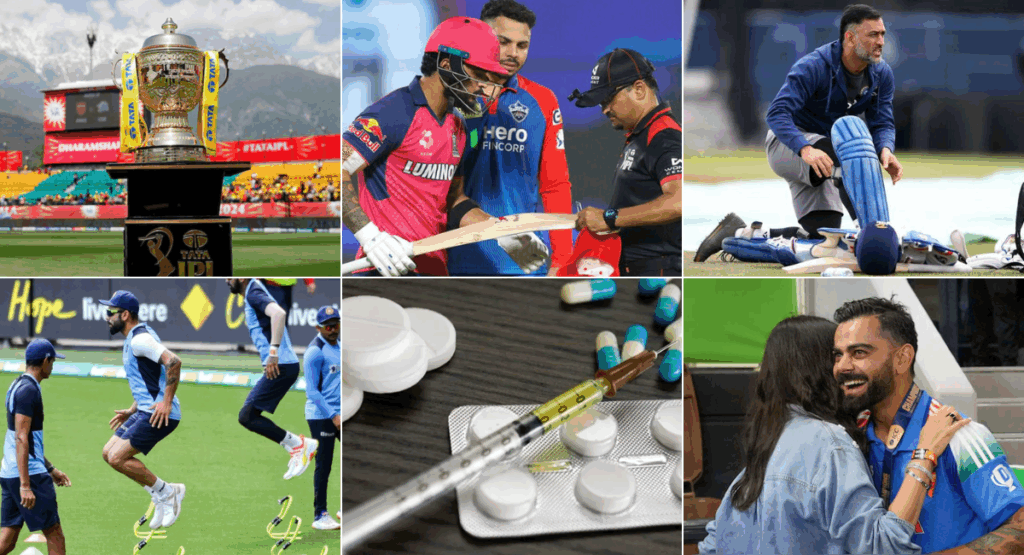
BCCI’s Rules and Regulations act as the backbone of Indian cricket. They cover everything from player contracts to team discipline. These rules don’t just exist on paper; they actively shape how the game is played and managed in India. By setting clear policies, BCCI makes sure that professionalism, fairness, and a solid structure are at the heart of Indian cricket.
Set of BCCI’s Rules and Regulations
Central Player Contracts
The BCCI employs a contract system for its players. It sorts them into four categories: Grade A+, A, B, and C. Grade A+ players earn ₹7 crore every year. Grade A players get ₹5 crore. Grade B players earn ₹3 crore. Grade C players receive ₹1 crore.
Players also earn match fees. Players earn ₹15 lakh for a Test match, ₹6 lakh for an ODI, and ₹3 lakh for a T20I. This pay structure not only rewards their performance but also motivates them to excel in the field. However, in return, players must play domestic matches when available, stay fit, and adhere to anti-doping rules.
IPL Player Rules
The Indian Premier League follows its own rules under the BCCI. Every squad member, including the Impact Player, earns ₹7.5 lakh per match. Teams must also respect the salary cap, which prevents overspending.
Overseas players must register for the auction. If they skip, they cannot play in the next season. Teams can only trade players during official transfer windows. If a player gets hurt, the BCCI needs to give the green light for a replacement. In addition, BCCI fines teams for slow over-rates and other violations.
Guest Player Rules
State teams can strengthen their squads with guest players. They can add up to three guest players in senior squads. However, this doesn’t hold for age-group cricket. Players moving to another state team must get a No Objection Certificate (NOC) from their old association. This keeps the process fair and transparent.
Equipment and Bat Standards
BCCI also checks cricket equipment. A bat cannot be wider than 108mm, deeper than 67mm, or thicker than 40mm. These rules prevent players from using unfair equipment. During IPL 2025, umpires carried out bat checks on the field. If a bat broke the rule, the player had to change it immediately. This kept the game balanced between bat and ball.
Player Conduct and Tour Rules
BCCI has rules for player behavior. Players must travel together, train as a group, and follow discipline. They cannot bring personal staff or do brand promotions during tours without permission.
The board also sets baggage limits. On long tours of more than 30 days, players can carry five bags or 150kg. On medium tours, they can carry three bags or 65kg. For the home series, they can carry 2 bags of 40kg. These rules help the team move easily without extra load.
Family Policy
BCCI allows family visits but with limits. On tours longer than 45 days, families can visit once per series for a maximum of two weeks. The board pays for shared accommodation, but players must pay for extra costs. This rule gives players family support while keeping focus on cricket.
Anti-Doping Rules
BCCI takes doping seriously. It tests players randomly and also through planned checks. If a player fails, they can face a ban of up to two years. The board can also cancel any records made during the doping period. This ensures fair play and keeps cricket clean.
Conflict of Interest Policy
BCCI avoids bias through a conflict-of-interest rule. For example, a selector cannot also work as a commentator, and a coach cannot act as a player’s agent. If someone has two roles that clash, they must declare it. If not, BCCI removes them. This keeps cricket management fair and transparent.
Conclusion
In short, BCCI’s Rules and Regulations cover contracts, IPL, conduct, and discipline. They reward good players, stop unfair practices, and protect cricket’s values. Because of these rules, Indian cricket runs in an organized and respected way.
FAQ on BCCI Rules and Regulations:
What are the BCCI’s rules and regulations for?
The rules maintain discipline, fairness, and professionalism in Indian cricket. They set clear standards for players, teams, and officials to follow.
How does BCCI decide player salaries?
BCCI uses a graded contract system. When it comes to player earnings, Grade A+ players rake in a whopping ₹7 crore, while Grade A players earn ₹5 crore. Grade B players take home ₹3 crore, and Grade C players get ₹1 crore. On top of that, players also receive match fees for every game they participate in.
What are the main rules for IPL players?
To participate in the IPL, players need to register for the auction. Each team member, including the Impact Player, receives ₹7.5 lakh for every match they play. Teams must also follow salary caps, official trade windows, and replacement rules.
What are the travel and baggage rules for players?
BCCI requires players to travel together. On long tours (30+ days), they can carry five bags or 150kg. On medium tours, three bags or 65kg. For the home series, you’ll need two bags, which are about 40kg. This keeps things uniform for the team.
Can cricketers take their families on tours?
Yes, but there are restrictions. On tours longer than 45 days, families can join once per series for up to two weeks. The board covers shared accommodation, while players pay for extras.
What happens if a player fails a doping test?
BCCI can ban the player for up to two years. It can also cancel records or achievements earned during that period.
What is the conflict of interest rule in BCCI?
An individual cannot hold two roles that overlap, like being a selector and a commentator. If such a situation arises, it must be declared. If not, BCCI removes the person from one role.

